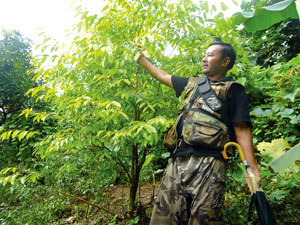 |
Called agarwood, the tree is found in southeast Asia and Assam, but is endangered and its export is banned in Vietnam and other countries. But Pun's 300 ropani farm in Palpa's Bharse village is now lush with adolescent agarwood, and there are another 100,000 saplings ready for transplantation.
The tree by itself is not fragrant, but secretes a thick resin when attacked by a mould which gives it its distinctive aroma and has been traditionally used as incense. Agarwood is now in high demand in the perfume industry.
This is not another get-rich-quick story. It takes 15 years before the trees are mature enough to harvest, but Pun says it is worth the wait because the wood commands prices as high as $30,000 per kg in the Middle East, Japan, Taiwan and China.
Pun's farm employs up to 40 people and he has put in Rs 7 million of his own savings. He says this is a long-term investment because he won't know the grade of agarwood that he will harvest for another 10 years. He started out with a few saplings imported from Thailand, but has now expanded his nursery and brought in two specialists from Assam to help him in the farm where he also raises 15 water buffalos and 75 goats.
The trees have been planted six metres apart, and in between Pun has planted local fruit and fodder trees and he is helped by his wife, Rukmaya and elder son, Ram. "My younger son doesn't want to farm. He is studying commerce in Chitwan, maybe he will manage the farm when the agarwood harvest starts coming in." Pun is also helping his ancestral village manage local schools, conserve surrounding forests and in local development.
Unlike other businessmen in Nepal who don't like competition, Pun is offering farmers from across Nepal his seedlings at cost price. Pun is using his military background to plan his farm with precision. He uses a GPS to calculate the location, slope and altitude of his farm and says 1,500 metres is the ideal altitude for agarwood farming in Nepal. Because of higher rainfall conditions are best in eastern Nepal.
Says Pun: "Agarwood has huge potential to increase farmer income since across the world native agarwood is almost gone and it must be grown as a cash crop in plantations."


